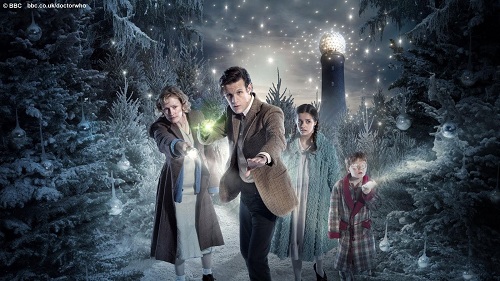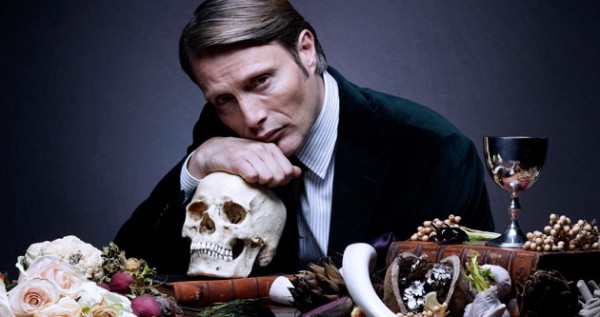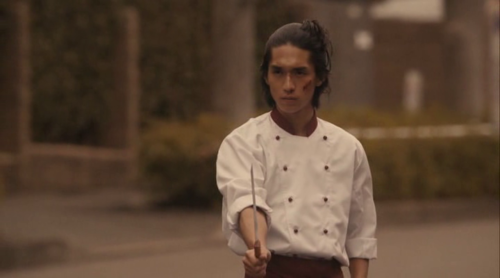Doctor Who, 2011 Christmas Special, “The Doctor, the Widow and the Wardrobe”
Written by Steven Moffat
Directed by Farren Blackburn
Aired Christmas at 9pm (ET) on BBC America
This week, on Doctor Who: The Arwell family’s Christmas present from the Doctor goes predictably awry
 Since its return in 2005, Doctor Who has established a tradition of its yearly Christmas specials. They’ve been varyingly successful over the years, with 2010’s excellent twist on A Christmas Carol the clear standout of the bunch. This year, showrunner Steven Moffat put a Whovian twist on The Lion, the Witch, and the Wardrobe and, while certain elements work well, the episode’s lack of character development and unearned sentimentalism bring down its promising premise.
Since its return in 2005, Doctor Who has established a tradition of its yearly Christmas specials. They’ve been varyingly successful over the years, with 2010’s excellent twist on A Christmas Carol the clear standout of the bunch. This year, showrunner Steven Moffat put a Whovian twist on The Lion, the Witch, and the Wardrobe and, while certain elements work well, the episode’s lack of character development and unearned sentimentalism bring down its promising premise.
One of the biggest problems with the episode is its lack of focus or narrative throughlines. After a brief prologue establishing the family, both before and during the war, we shift to following the Doctor, as we watch him channel his goofy side. Then we shift to Cyril as he explores the Doctor’s Christmas present- a trip through a tidily wrapped dimensional portal. Then we’re with the Doctor and Lily as they search for him. Just when we’ve begun to assume Madge will be sitting this one out, she’s back in the picture, looking for her kids. Perspective ping-pongs for a while until the group meets up and Madge becomes the focus for the last third of the episode. Trouble is, we don’t know or care about her, beyond a generic pity that her husband is dead and some appreciation of her spunk.
 Madge doesn’t change or progress over the course of the episode- no one does. The closest we get to character development is the Doctor’s episode-ending happiness. However, this is a realization, that he doesn’t have to be alone and is well-loved by his friends, that we’ve seen the character make time and again. After a while, the same dramatic beat, no matter how excellently played by the actor in question (Matt Smith is great here), loses its significance. Instead of spending time getting to know the characters, Moffat kills time showing Cyril’s trip through the forest, then Lily’s, then Madge’s. Yes, this builds an effective tone of foreboding and dread, but given its lack of payoff, the time feels wasted.
Madge doesn’t change or progress over the course of the episode- no one does. The closest we get to character development is the Doctor’s episode-ending happiness. However, this is a realization, that he doesn’t have to be alone and is well-loved by his friends, that we’ve seen the character make time and again. After a while, the same dramatic beat, no matter how excellently played by the actor in question (Matt Smith is great here), loses its significance. Instead of spending time getting to know the characters, Moffat kills time showing Cyril’s trip through the forest, then Lily’s, then Madge’s. Yes, this builds an effective tone of foreboding and dread, but given its lack of payoff, the time feels wasted.
There is a brief, though entertaining, interlude with some foresters which, in hindsight, makes even less sense than it does upon initial viewing (they teleport up and leave their entire ship behind- why were they there in the first place?), but while Bill Bailey is a welcome addition, he’s utterly wasted. The unreadable creature design for the King and Queen is initially visually interesting and impressive, but this forces young Maurice Cole to sell the weight of the situation, as Cyril is the only one able to understand and hear the, “screaming” of the trees. This moment, which is highly reminiscent of Donna’s hearing the Ood song in series four’s, “Planet of the Ood”, (which Catherine Tate knocked out of the park), doesn’t even register. By the time Madge has taken Cyril’s place, the King and Queen are nearly insignificant, as Madge is center stage, and the entire creature design and concept feels like little more than an excuse to pay off the recurring Sonic, “It doesn’t do wood” gag.
 The Deus Ex Machina timey-wimey ending (for the Arwell family at least) could be heartwarming, but the lack of emotional connection to the characters keeps it from working. What should be a happy relief is instead convenient, saccharine, and utterly false. (And that’s without the separate issue that a WWII plane shouldn’t be able to survive a flight through the Time Vortex.) The first leap of faith, Madge’s ability to pilot the forester’s ship, we may go with, but asking the audience to make that leap twice is too much. Even the tag doesn’t work- Matt Smith is fantastic, but no one could sell, “Humany-wumany”.
The Deus Ex Machina timey-wimey ending (for the Arwell family at least) could be heartwarming, but the lack of emotional connection to the characters keeps it from working. What should be a happy relief is instead convenient, saccharine, and utterly false. (And that’s without the separate issue that a WWII plane shouldn’t be able to survive a flight through the Time Vortex.) The first leap of faith, Madge’s ability to pilot the forester’s ship, we may go with, but asking the audience to make that leap twice is too much. Even the tag doesn’t work- Matt Smith is fantastic, but no one could sell, “Humany-wumany”.
Perhaps most frustrating of all is the fact that Moffat has proved himself very capable of pulling off just this kind of a story, in series one’s fantastic two-parter, “The Empty Child”/”The Doctor Dances”. That story, also set in WWII England, dealt with similar familial loss, introduced an incredibly strong female guest star, and featured a rare, at that point at least, tidy and convenient happy ending. Of course, Moffat and Blackburn aren’t helped by Murray Gold’s incredibly over the top reunion music, but more than anything, the family we get here doesn’t feel nearly as real or relatable as the ragtag bunch from series one, or even just Nancy, that story’s Madge.
 Despite the gripes above, the episode isn’t bad. The Doctor is kooky and fun, the kids are pretty good, and the visuals are mostly very strong. The conceit of natural Christmas trees is inventive and the image of the tree’s souls glittering above the landscape is beautiful. Giving Moffat the benefit of the doubt that this isn’t a throw-away convenience, the notion of the Doctor’s coming as prophesy is particularly interesting and could lead in well to next year’s run. It also goes without saying that the closing scene between the Doctor, Amy, and Rory is excellent and it’ll be a shame when Karen Gillan and Arthur Darville bow out of the series.
Despite the gripes above, the episode isn’t bad. The Doctor is kooky and fun, the kids are pretty good, and the visuals are mostly very strong. The conceit of natural Christmas trees is inventive and the image of the tree’s souls glittering above the landscape is beautiful. Giving Moffat the benefit of the doubt that this isn’t a throw-away convenience, the notion of the Doctor’s coming as prophesy is particularly interesting and could lead in well to next year’s run. It also goes without saying that the closing scene between the Doctor, Amy, and Rory is excellent and it’ll be a shame when Karen Gillan and Arthur Darville bow out of the series.
For many, this is just the Christmas episode they are hoping for, a light diversion from the holiday and a welcome shot of Who before the long wait ‘til next fall. It’s far from the worst of the series’ Christmas specials and, actually, is probably in the upper half. Having seen what this team is capable of, however, from writing, to production, to acting, one can’t help but feel disappointed that they decided to settle for a light diversion.
Kate Kulzick





